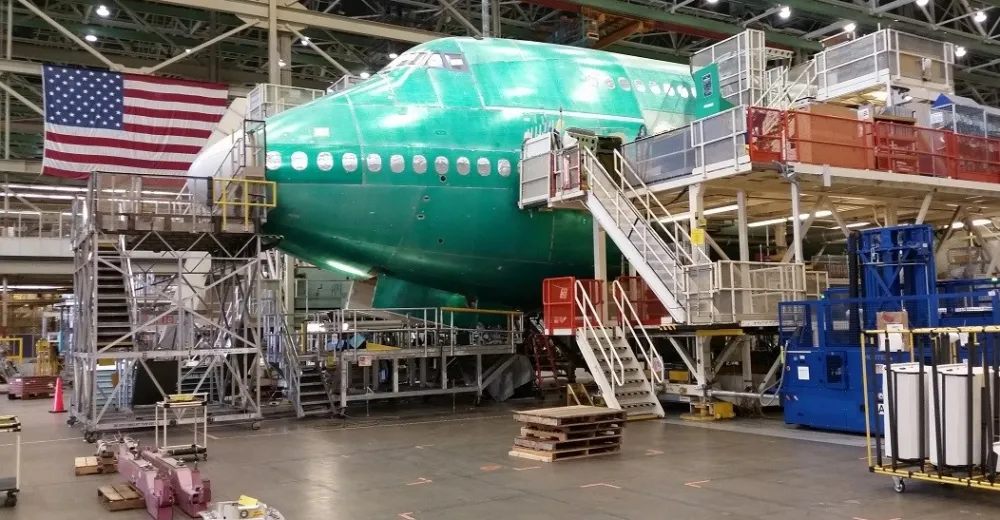
Boeing taps GE exec as new head of Commercial Airplanes
Nov 21, 2016

Boeing has appointed a seasoned executive from General Electric as the new head of its Commercial Airplanes division, marking a strategic move to revitalize the business amid ongoing challenges in the aerospace industry. The new leader brings a wealth of experience in engineering and manufacturing, with a proven track record in driving innovation and operational efficiency. This leadership change aims to strengthen Boeing's position in the competitive market and enhance its focus on developing next-generation aircraft. The transition reflects the company's commitment to improving performance and restoring confidence among stakeholders as it navigates through recent turbulence.
Boeing has recently appointed a new head for its Commercial Airplanes division, bringing in an executive from General Electric (GE). This strategic move is part of Boeing's ongoing efforts to strengthen its leadership and enhance its position in the highly competitive aerospace market. The appointment is seen as a significant step toward revitalizing Boeing's Commercial Airplanes segment, which has faced numerous challenges in recent years.
The Strategic Importance of the Appointment
The decision to tap a GE executive underscores Boeing's commitment to innovation and operational excellence. GE has a long-standing reputation for its engineering prowess and operational efficiency, traits that Boeing is keen to leverage. This new leadership is expected to bring fresh perspectives and strategies that can help streamline operations, reduce costs, and improve product offerings.
Challenges Facing Boeing's Commercial Airplanes Division
The Commercial Airplanes sector has faced several hurdles, including supply chain disruptions, production delays, and a global decline in air travel due to the COVID-19 pandemic. These challenges have significantly impacted Boeing's ability to deliver aircraft on time and maintain its market share. The new head of the division is tasked with addressing these issues head-on.
Some of the key challenges include:
- Supply Chain Disruptions
- Regulatory Scrutiny
- Intense Competition
Expectations from the New Leader
Industry analysts are optimistic about the new head's potential to navigate these challenges effectively. With a robust background in engineering and management from GE, the new leader is expected to implement best practices and foster a culture of innovation within the Commercial Airplanes division. Key expectations include:
- Enhancing Operational Efficiency
- Improving Customer Satisfaction
- Driving Innovation in Aircraft Design
Impact on Boeing's Future
Boeing's decision to bring in a GE executive reflects a broader trend in the aerospace industry, where companies are increasingly prioritizing leadership with cross-industry experience. This strategic hiring can lead to the adoption of cutting-edge technologies and methodologies that can benefit Boeing's aircraft production processes.
As the new leader settles into their role, stakeholders will be closely monitoring changes in Boeing's operational strategies and product development timelines. The hope is that this fresh leadership will rejuvenate Boeing's Commercial Airplanes segment and restore investor confidence.
Comparative Analysis: Boeing and GE in the Aerospace Market
To understand the implications of this leadership change, it is essential to compare Boeing and GE in terms of their contributions to the aerospace market. Below is a table highlighting some key aspects:
| Aspect | Boeing | General Electric |
|---|---|---|
| Market Focus | Commercial and Military Aircraft | Aerospace Engines and Systems |
| Recent Challenges | Production Delays, 737 MAX Crisis | Transition to Sustainable Aviation |
| Innovation Areas | Aircraft Design, Autonomous Flights | Jet Engine Efficiency, Hybrid Technology |
| Financial Performance | Revenue Decline Due to COVID-19 | Strong Recovery, Focus on Sustainability |
Looking Ahead: The Future of Boeing's Commercial Airplanes
The future of Boeing's Commercial Airplanes division will depend significantly on the new leader's ability to implement strategic changes and drive innovation. As the aerospace market gradually recovers, the demand for new aircraft is expected to rise. Boeing's ability to capitalize on this demand will hinge on its operational efficiency and product competitiveness.
Furthermore, as sustainability becomes a priority in the aerospace industry, Boeing is likely to focus on developing more eco-friendly aircraft. This aligns with the global push toward reducing carbon emissions and enhancing fuel efficiency. The new leader's experience at GE could play a crucial role in advancing these initiatives, particularly in leveraging sustainable technologies.
Conclusion
Boeing's appointment of a GE executive as the new head of Commercial Airplanes marks a pivotal moment for the company. This leadership change is not just a response to current challenges but also an opportunity to innovate and reshape Boeing's future in the aerospace industry. As the company navigates the complexities of the post-pandemic recovery, all eyes will be on how this new leadership can transform Boeing's Commercial Airplanes division into a more efficient, innovative, and competitive entity.
Related Articles

Explore Thailand: The Best Islands to Visit for Paradise, Adventure, and Relaxation

The Ultimate Guide to the Best Islands in Thailand for Your Next Getaway

Do babies need passports? How to get a passport for a newborn

How to get a U.S. passport fast: here’s how to expedite the process

What is Mobile Passport Control: 5 reasons why you should use it

SENTRI vs. Global Entry: A detailed guide

Do you need a passport to go to the Bahamas? Let’s find out

Do you need a passport to go to Mexico? A detailed guide

Do you need a passport to go to Canada? We got the answer

Do You Need a Passport for a Cruise: An Essential Travel Guide

Booster Seat Requirements: All the Rules to Follow in Your Rental Car

What Are the World’s Most Powerful Passports, and How Does Yours Rank?

How to Take a Passport Photo at Home: A Helpful Guide

You've got to have heart! Southwest's new livery

Your opinion: Should water be free on low cost carriers?

Young women bolder than guys as solo travellers
